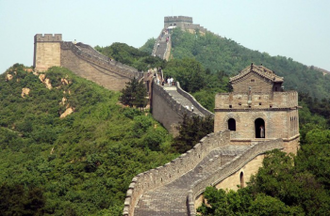China: Reflection from Wuhan

The Great Wall
The author is a Catholic living in Wuhan, China. In mid-November 2015 a variety of circumstances in Wuhan led me to be introduced to a provincial official who works in the area where the civil authorities communicate with the Catholic Church. All the indications were that his role is a senior position in the province, a fact supported by the careful attention that his assistant was giving him on that Monday morning. Following a typically friendly Chinese approach during initial introductions, an intriguing question was posed by the official. He asked me if I knew the Church's view on the terrorist attacks that had taken place in Paris the previous Friday night. He was referring to the traumatic night in Paris when coordinated terrorist attacks at six locations claimed the lives of 130 people and left hundreds of others injured.
Aware of the carnage that had occurred in Paris, I said that I had not actually read any response from the Church to the tragedy. However, I added that I expected the Church would express its deep sadness at the loss of life, its prayers and consolation for those who were injured and grieving, as well as the need for an ongoing commitment to genuine understanding between peoples of different faiths and cultures.
Having communicated what I expected would be included in a Church response to the events in Paris, the official's contribution from across the table took me a little by surprise. In a calm voice he said that Pope Francis had spoken at the weekend about the Paris terrorist attacks. This was followed up by him saying that what was said by Pope Francis was very good.
My surprise at what I was hearing was based on a number of facts. Firstly, this was a Chinese official asking about the Church's response to a major event that had taken place a long way from his own area of responsibility. Secondly, it showed that one Chinese official had been paying attention at the weekend to a statement made by Pope Francis. Thirdly, he was evaluating that statement by Pope Francis in a positive way.
In China very few glimpses are provided into how officials personally view the Church, especially at an international level. However, on this occasion it seemed to be different. A view was being expressed that recognised the wisdom of what the Church can offer to the world, especially in times of deep distress.
Within an hour we concluded our discussion, shook hands and went our separate ways. As I departed, I pondered on how China really perceives the Church at this time in history. Perhaps what is expressed publicly by officials in China and what is casually recycled from recent history about the Church in China by international media outlets are in danger of obscuring changes of perception that may be happening slowly for some people within the vast bureaucracy that reaches to every corner of China.
This year's combination of the Covid-19 pandemic, the ongoing international trade tensions and the recent events that have led to the closure of consulates, reveal that China is currently living through one of its more difficult years on the international stage.
At a time when a unified international approach is needed to cope with the most challenging pandemic in a century, the need to avoid further aggravation in international relations seems to be essential. On that morning in 2015 I was surprised to find out that one official in China was paying such close attention to the Church's view on international events. In spite of all the complexities and contradictions that exist in China, it is possible that some people within the country's administration are paying attention to what is being said by the Church in these times of uncertainty, whether this is the Church's approach to supporting people through the COVID-19 pandemic or statements seeking to bring calm and understanding to strained international relations. A clearly expressed view by the Church about these challenging situations has the possibility of finding its way to the hearts and minds of leaders in China even though the Church view will not stir public comment here.
For many years the Catholic Church in China has been cautiously finding its way forward in a domestic setting that has been every bit as complex as China's current international setting. The enduring ability of many Church leaders in China to negotiate these turbulent domestic waters and also find ways to serve the needs of some of the most neglected people in society never ceases to amaze me. Perhaps their faithful witness to the Gospel is part of what encourages some people in positions of civil authority in China to give serious attention to the Church's view on the shared issues facing all of humanity at this time in history.
An expression in the Chinese language which translates as "high mountain, flowing water" celebrates the friendship that emerges when a musician eventually finds a person who can recognise the mountain and the water that are symbolised in the tunes he plays on his ancient lute. The educated musician on the shore and the poor man who stepped off a small boat in the dark of night were unlikely friends. However, their shared appreciation of music provided them with the common ground to forge a new friendship. Perhaps the same approach needs to be at the heart of international dialogue at this time, a setting where the common focus becomes the needs of those who are struggling with the devastation caused by current global upheaval. While the Church's view on global issues will not receive public comment in China, we should not assume that its view is falling on deaf ears. The Church's ongoing ministries to people in need and its ability to express a balanced view on international events can contribute to a way forward, even if that contribution does not receive public recognition.


















